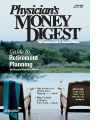Second Home Helps Fund Retirement
New research by the NationalAssociation of Realtors(NAR) and EscapeHomes.com reveals that secondhome purchases aimed primarily atinvestment (vs the more traditionalseasonal getaway uses) have nearlydoubled in the past 3 years. Thestudy found that 37% of all second homepurchases in 2002 wereintended mainly to generate investmentreturns, compared with 20%only 4 years ago back in 1999.
This growing class of buyers iscomprised of baby boomers that arelooking ahead to retirement and aredissatisfied with other investmentreturns, according to the realty association'snational statistical sampleof buyers. Many physician investorsare finding that secondhomes provide greater appreciationgains compared with competinginvestment possibilities.
SOARING HOME VALUES
Many stock portfolios and retirementaccounts have lost up to 35%of their value since 2001. Medianhome values, on the other hand,have skyrocketed. The average homehas increased in value by 38% in thepast 60 months, while most of theprime second-home states—thosewith recreational and resort communitieswithin a 2 or 3 hour drive oflarge cities—have seen even higherappreciation. Such rosy outcomescombined with a demographic waveof baby boomers are likely to ensurethe continued growth of investment motivatedpurchases. The NAR saysthat enough boomers will reach theirmid-50s—the prime second-homeinvestment years—during the next10 years alone to support constructionof up to 150,000 vacationhomes a year.
What differentiates an investmentpurchase from the purchase ofa second home intended for use as avacation home? Vacation homes areusually purchased for seasonal orweekend use, and are occasionallyrented out. Investment purchases,however, generally focus on secondhomes that can be rented out for anaggregate 6 months or more everyyear, with occasional use by theowners. These buyers are mainlyinterested in the property's incomepotential—net rental income andlong-term capital appreciation.
In fact, 20% of second-homebuyers surveyed indicated thatrental income was their reason forpurchase, up from 15% in 1999.Nearly 30% of buyers said theyexpected the property to be convertedto their retirement home inthe future. Doing so could providesignificant tax-saving benefits, byopening up the $250,000 (per person)and $500,000 (per couple)federal capital gains exclusions forresale profits on primary residencesto those buyers. Second homes donot qualify for the exclusions.
CONSIDERATIONS
Home Buying for Dummies
If you are thinking about investingin a second home, the referencebook (John Wiley & Sons; 2001) recommendsthat you avoid time-sharecondominiums. The following illustrationtaken from the book highlightshow investors can lose a substantialamount of money fromtheir involvement with time-shares.
When you buy a time-share,you're basically buying the ownershipof one week's use of a condominium.For this example, let's sayyou pay a one-time fee of $7000. Ifone week costs $7000, buying theentire year's rights to use the timesharecondo will come to more than$350,000. By comparison, buying asimilar condo in the area may onlycost you about $125,000. With atime-share, you are paying a largemarkup on your week's ownershipbecause of the costs of selling allthe additional weeks, as well ascontributing to the time-share distributor'sprofit. Add in your shareof the annual maintenance fees,and it quickly becomes a money losingdeal. (Keep in mind thattime-share condominiums are verydifficult to sell on the market.)
Before investing, calculate theproperty's cash flow (ie, its monthlyrental income minus the monthlyexpenses). In addition, find outwhether you can claim a rental losson your personal income tax returnin the event you purchase a rentalproperty that produces a negativecash flow. If you earn more than$100,000 per year, your ability todeduct rental losses may be limited;if you earn more than $150,000 peryear, you may not be able to deductany of your rental losses.Be aware that resale values ofsecond homes are usually far morevolatile than primary homes. Whenthe economy takes a downwardturn, the values of second homessuffer earlier and more dramaticallythan do primary residences.
Another negative:
Second homesin resort or recreational areas presentcomplications that are rare with primaryhomes. For example, rentalmarketing and management can beexpensive enough to gobble up anticipatedpositive cash flows.
Purchasing a second home as aninvestment toward retirement, likemost investments, has both goodand bad points. Keep in mind thatlocating, negotiating, and closing onproperty can take up a lot of yourtime. Then there are the tasks ofmanaging the property and findingtenants. Evaluate your lifestyle to besure that real estate investing is rightfor you.
